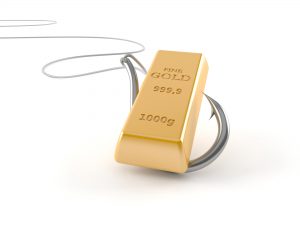Gold Worm on The Yuan Hook
The comments above & below is an edited and abridged synopsis of an article by Hugo Salinas Price
China is going to offer their oil suppliers a payment plan: Accept yuan for oil (bypassing the the US dollar), with the option of exchanging the yuan for gold purchased on the world markets (not from Chinese reserves).
 For the first time in 46 years—ever since August 15, 1971, when Nixon took the US off gold—gold is once again mentioned as part of a commercial deal, one of great importance.
For the first time in 46 years—ever since August 15, 1971, when Nixon took the US off gold—gold is once again mentioned as part of a commercial deal, one of great importance.
The gold price will rise as more oil income is exchanged for gold, and the gold income will become more valuable for the oil exporters. The first sellers of oil to China in the oil-to yuan-to gold deal will get a lot of gold for their oil. As the plan progresses, they will get smaller amounts of gold for their oil.
As gold commences a historic rise, the dollar will suffer a historic decline in acceptability, because higher gold means a lower dollar; more dollars will be needed to purchase gold.
Other exporters of commodities to China will want in on the deal—their goods sold to China for gold, not dollars. We may be on the verge of a monetary revolution, one that will end the US dollar’s reserve currency status. The dollar may become worthless in terms of gold. As a world power, the US would be castrated.
Countries that hold US dollars as reserves will be aghast as they see their value collapse in terms of gold. Too late, they will hasten to acquire more, adding to the rush for gold.
The implications for the Chinese move are vast. The gold standard may return simply because of a spontaneous turn to gold as a means of trade initiated by the Chinese measure.
Perhaps the return to gold as the world’s money had to be through a decisive action on the part of a single entity. In this case, by China’s decision to bait the yuan hook offered to oil exporters with a gold worm.
